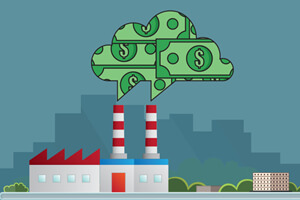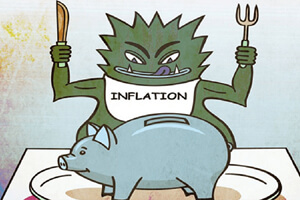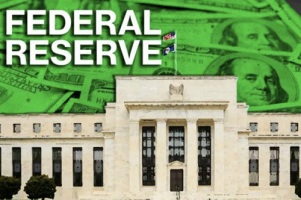How Do Governments Make Money?
Narrator: These are challenging times. Governments are trying to keep their economies alive by injecting billions of dollars across the board. However, they are trying to do so while receiving less money, a very difficult task, especially for nations where public debt was already high before the pandemic. So, how do governments make money?
For most governments, the main source of revenue is taxes. Here in the U.K., the biggest chunk comes from taxes on people’s earnings, known as Income Tax and National Insurance Contributions.
If you are employed in the U.K., these come out of your paycheck even before it lands in your bank account, while in the United States, salaried workers often have to pay a retrospective tax bill based on their previous year’s earnings.
There are also plenty of indirect taxes levied when goods and services are sold. When you buy a coffee, a chocolate bar or a car, well, that’s taxed, too.
These consumption taxes, such as the U.K.’s VAT or India’s Goods and Services Tax are another important source of revenue. In fact, taxes on income and consumption amount to about two thirds of tax revenues in the U.K.
They are also used as a way for governments to influence people’s behaviour. For example, the U.K. introduced a “sugar tax” aimed at tackling childhood obesity in 2018. This means that consumers are discouraged from buying sugary soft drinks as these become pricier in comparison with healthier alternatives. Besides being levied on other unhealthy products, such as alcohol and tobacco, duties can also be used to discourage environmentally-damaging activities, such as driving petrol- or diesel-powered vehicles.
The next chunk of government income comes from taxes on property, whether on your own or on commercial spaces. There are a number of other smaller duties, too, when selling or inheriting real estate, which end up boosting the government’s coffers.
It’s a similar picture in the U.S. About half of federal revenue comes from individual income taxes, while about a third of the total comes from payroll taxes that fund social insurance programs. Companies are also taxed on their profits. However, corporate tax in the U.S. has fallen as a proportion of government receipts since the 1950s, reflecting how the United States has tried to encourage business activity with lower rates.
While taxation patterns are mostly similar in developed countries, low-income nations are more reliant on trade and consumption taxes due to the nature of their economies. For example, agricultural workers rarely have fixed or regular incomes, making it hard to calculate income taxes.
The tax collection system in low-income economies also tends to be less efficient, which in turn makes generating revenue harder. Even for an oil-rich country like Saudi Arabia, which has no income taxes, its increased spending in 2020 forced it to triple its consumption tax to 15%.
Traditionally, governments have tried to match their expenditure with the money they receive from all of these sources of income, also known as running a balanced budget. However, they can run a deficit and borrow money from financial markets to make up the shortfall. But this is a delicate balancing act because interest payments can mount up, effectively increasing spending. If lenders worry about the total level of debt getting out of control and threatening the ability of a government to repay them, they charge a lot more for these loans.
In the eurozone, for instance, Italy’s bonds offer a higher yield than Germany’s, even though they share a currency, because lenders have more confidence in Germany’s ability to repay its debt. While central banks can just print more money in theory, either to repay these loans directly, or to swap for foreign currency if they borrowed in dollars, adding more money to the economy risks stoking inflation and has devastated economies in the past. Although some economists have recently started to question whether this is the inevitable consequence of higher spending, especially for big economies such as the U.S., it’s going to take a lot of convincing before lawmakers feel confident running huge deficits for a long time.
However, U.S. President Joe Biden has said he supports setting aside concerns about the country’s deficit so more money can be spent now to prop up the economy. This brings us to why we are now more likely to pay even more in taxes. Governments have had to step up their spending in the wake of the pandemic. The health emergency halted a lot of economic activity, and governments across the world have been paying companies to keep workers on their payrolls, increasing unemployment benefits and supporting health services. They have also delayed tax bills for businesses so they have a bit longer to find the cash.
These measures, though necessary, are emptying the coffers of many treasury departments around the world. Given how important citizens’ contributions are for their income, governments are expected to increase taxes in the coming years to restore their finances.
The U.K.’s independent watchdog for public finances said that tax rises or spending cuts of between $29 billion and $63 billion will be needed just to stop public debt levels from rising relative to GDP. In his latest plans for the economy, the U.K.’s finance minister has already announced an increase in corporate tax.
Rishi Sunak: It’s going to take this country, and the whole world, a long time to recover from this extraordinary economic situation.
Narrator: This is why we hear more leaders discussing new taxes, such as on profits made by digital giants and on pollution. While we don’t know when taxes will rise, and by how much, it is likely these levies will be passed on to consumers, which means there’s a good chance we’ll paying more to the government before very long.
Hi, everyone, thank you so much for watching. How do you feel about potentially paying more taxes? And what should governments be taxing? Let us know in the comments section, and I’ll see you soon.















